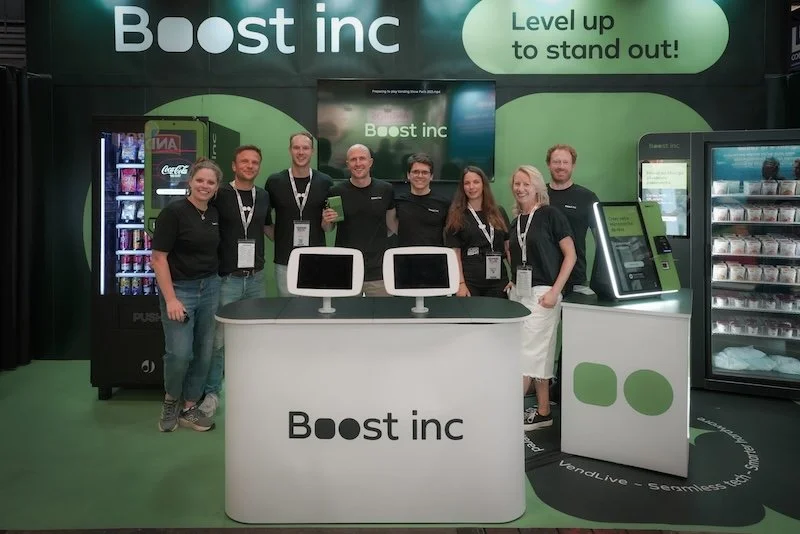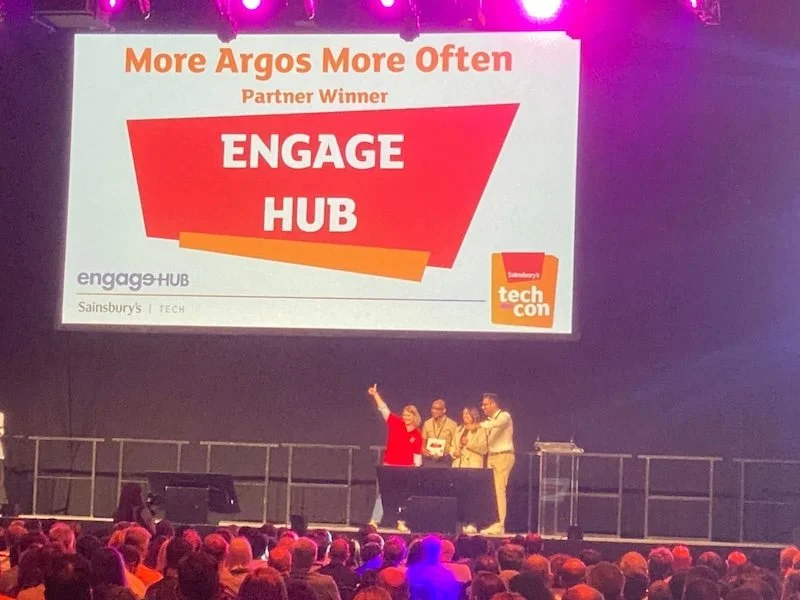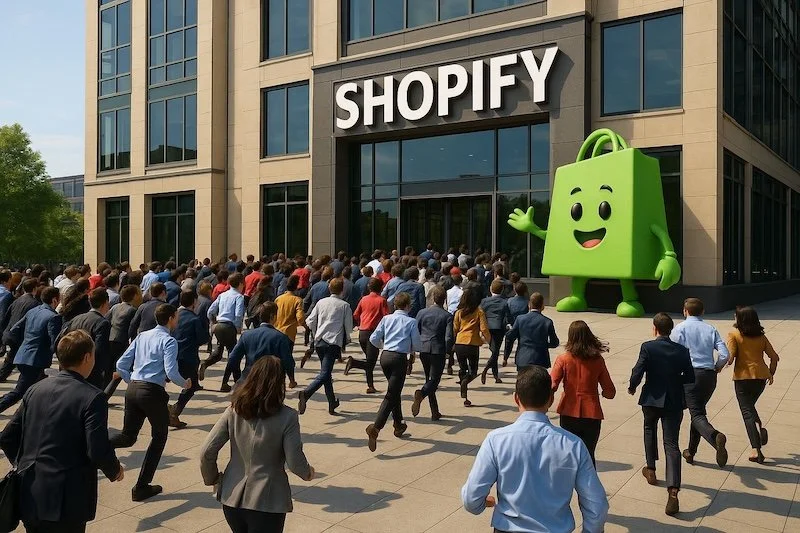Strikes, resignations, and new starts: Here’s what happened in the retail technology space during January
Check out our review of an eventful start to the year for the retail systems sector, including checkout-free stores, hefty funding rounds, new fashion tech startups, and high profile resignations.
Good month for…
Żabka Group was this month out in force at NRF 2023 in New York.
Żabka Nano, an autonomous store concept that has been developed under the umbrella of Żabka Future for over a year and a half, was featured at the Microsoft booth.
And now Patryk Powierża, Growth Lead at Żabka Polska, has taken to LinkedIn to sum up the firm’s time at the show.
Autonomous technology will drive the retail industry, he argued.
“We have had great talks with worldwide retailers. All of them were interested in the details of approaching autonomous technology from the retailer's perspective and our plans for how to scale it up. Most of them were from Asia and North and South America,” he wrote.
He added: “The doors of our Nano store were opened about 1,200 times. Most of the visits included groups of about five to eight people.”
“We can say that a few thousand people had a chance to check the Żabka Nano store. From unofficial info, we know that the Microsoft booth was one of the most interesting during the whole event.”
Powierża concluded: “Opening the pop-up store in NYC was a challenge. I used to compare our store to Ikea Retail, but sending a store from Poland to the USA wasn’t an easy job.”
“The store was assembled in three days and it was fully functional. It only proves how flexible our technology is.”
Emperia, which creates immersive e-commerce spaces for retail brands, raised a $10 million Series A.
This follows an $875k pre-seed in 2021 (featuring Concept Ventures, SFC Capital, Blissgrowth).
The Series A round was led by Base10 Partners and joined by investors including Daphni (via its retail fund Dastore), Sony Innovation Fund, Background Capital, Stanford Capital Partners and Concept Ventures. Angels include Blissgrowth’s Jay Radia.
Emperia's clients include Dior, Bloomingdales and Lacoste. It was launched by fashion and retail specialist Olga Dogadkina and VR innovation expert Simonas Holcmann in 2019.
It will use this fresh funding to grow its team, develop its virtual store SaaS platform and deepen the capabilities of the data suite that powers it, with the aim of accelerating global market presence .
It also plans to utilise virtual store customer data to provide retailers with even better tools with which to personalise the customer experience.
Emperia will also work with partners to bring various global virtual e-commerce solutions under one roof; leveraging the fast growing Web3 ecosystem and its partners’ brand and retail technologies to deliver “game changing customer experiences”.
Oxbotica, a specialist in autonomous vehicle software, raised $140 million in Series C investment.
The round includes financial and strategic partners from North America, EMEA and APAC, including new investors such as Aioi Nissay Dowa Insurance Co. and ENEOS Innovation Partners.
Current shareholders who are re-investing include bp ventures, BGF, Halma, Hostplus, Kiko Ventures (IP Group), Ocado Group, Tencent, Venture Science and ZF, amongst other global companies.
Oxbotica has raised approximately $225 million to date.
The latest funding will drive its geographical expansion in North America, EMEA and APAC, and accelerate the deployment of its autonomy operating system in domains where there is both urgent need and potential to scale, such as agriculture, airports, energy, goods delivery, mining and shared passenger transportation.
Wakefern Food Corp. opened The Pantry, a checkout-free convenience store for the workers at its Edison, New Jersey campus that features Trigo technology.
This uses computer vision with a series of cameras and shelf sensors to identify products picked up by people.
Wakefern is the first US company to test Trigo's technology, which has been deployed by several retailers in Europe and the UK, including REWE and Tesco.
“Our associates can shop The Pantry at work for groceries they need at home while simultaneously providing helpful feedback for us on the technology,” said Charles McWeeney, VP of Technology, Innovation and Strategy at Wakefern.
“The chance to evolve in the self-service space at retail is important and we hope to learn more about frictionless checkout and how we can potentially provide this cutting-edge and convenient technology to Wakefern member owned businesses.”
Bad month for…
Last year, Aldi Nord opened a Trigo powered Aldi Shop & Go store in the Dutch city of Utrecht.
This is a 3,982 square feet location where shoppers can walk in, select their items, and walk out without having to queue at the checkout lane or scan any items.
In its largest store format to date, Trigo applies its algorithms to shelf sensors and ceiling mounted cameras which analyse anonymised shoppers' movements and product choices.
Payments and receipts are settled digitally.
The store featured in one of our weekly coolest retail technology plays round ups.
And Jan Oostvogels, CEO at Aldi Holding in the Netherlands, said in a press release: "We are very proud to be able to test this innovation project in Utrecht together with our customers.”
“It fits our strategy as a discounter to make shopping as easy as possible for our customers. After all, our experience shows that our customers appreciate quick and easy processes at the checkouts. Our test shop in Utrecht fits this perfectly."
But not everybody is a fan.
Jelle Prins, who has designed apps for the likes of Uber and Booking.com, popped along to see what all the fuss was about and ended up venting spleen on Twitter.
Zomato Co-founder and Chief Technology Officer Gunjan Patidar handed in his resignation at the Indian food delivery firm.
He is the fourth Co-founder to depart the company. The move follows exits by Mohit Gupta, another Co-founder, and two other senior executives last month.
Patidar spent 10 years at Zomato.
In a stock exchange filing, it disclosed: “Patidar was one of the first few employees of Zomato and built the core tech systems for the company.”
“Over the last ten plus years, he also nurtured a stellar tech leadership team that is capable of taking on the mantle of leading the tech function going forward. His contribution to building Zomato has been invaluable.”
Loss making Zomato, which is backed by Ant Group, Temasek and Goldman Sachs, did not give a reason for any of the aforementioned departures.
In November, it announced that it would lay off nearly three per cent of its workforce as it pursued profitability.
Also this month…
Danielle Vermeer left her “dream job” leading resale fashion CX at Amazon for life at a fashion tech startup.
She is now Co-founder and CEO at Teleport, a social commerce app to share and shop outfit videos in a Gen Z driven community (think TikTok and Depop combined).
In a Twitter post, she said: “I believe the future of fashion is where content, community and (re)commerce collide.”
“Younger consumers want a “third space” online to express their authentic style and to shop cute clothes from trusted peers. I’m obsessed with making this vision a reality.”
Hundreds of workers staged the first ever Amazon strike in the UK this month.
Employees at the e-commerce giant’s fulfilment centre in Coventry walked out over its 50 pence per hour pay offer (offering them £10.50).
An industrial action ballot saw a majority of more than 98% of workers vote to strike, according to the GMB union.
Stuart Richards, GMB Senior Organiser, said: “These workers have defied the odds to become the first ever Amazon workers in the UK to go on strike.”
"They’re taking on one of the world’s biggest companies to fight for a decent standard of living. They should be rightly proud of themselves.”
“After six months of ignoring all requests to listen to workers’ concerns, GMB urges Amazon UK bosses to do the right thing and give workers a proper pay rise.”















Continue reading…